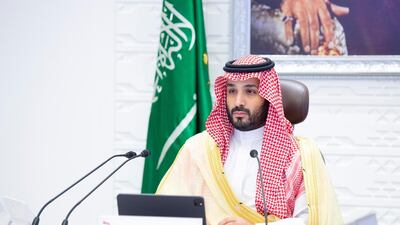Leaders of the world’s 20 biggest economies said they are committed to the fair distribution of Covid-19 vaccines around the world and pledged to support poorer nations at the end of their annual summit.
“We recognise the role of extensive immunisation as a global public good,” the G20 leaders said in a joint declaration on Sunday evening, adding that they were supporting the development and distribution of tests, therapies and vaccines. “We will spare no effort to ensure their affordable and equitable access for all people, consistent with members’ commitments to incentivise innovation.”
The statement of resolve to continue supporting the global economy, helping distressed nations and fighting the pandemic marked the end of the two-day G20 leaders’ summit under the presidency of Saudi Arabia, the only Arab country in G20 fold.
The G20 leadership convened online on Saturday and Sunday instead of leaders arriving in Riyadh for the summit, which was dominated by discussions about the worsening pandemic and the uneven global economic recovery in its wake.
The G20 leaders' declaration followed a call by Saudi Arabia’s King Salman on Saturday that the organisation “must work to create the conditions for affordable and equitable access to [vaccines] for all peoples”.
The virus has infected about 59 million people and killed over 1.39 million, according to Worldometer data. The G20, which accounts for about 85 per cent of the world's gross domestic product, pledged more than $21bn in June towards diagnostics, vaccines and therapeutics to fight the pandemic.
Governments and regulators have worked closely with pharmaceutical companies and there is optimism about a global inoculation programme after new vaccines from Pfizer and Moderna, among others, proved more than 90 per cent effective in early trials.
The G20 said it supports “all collaborative efforts” to fight the pandemic, especially the Access to Covid-19 Tools Accelerator (ACT-A) initiative – a global project for vaccines, tests and therapeutics.
“We commit to addressing the remaining global financing needs,” the group said.
UN chief Antonio Guterres on Friday urged G20 leaders to fund a programme to rollout Covid-19 vaccines to poorer countries and help raise $28bn towards UN anti-Covid-19 efforts. The EU on Saturday called for more funding for ACT-A.
"I called for $4.5bn," European Commission head Ursula von der Leyen said on Twitter on Saturday. "We need to show global solidarity," she said.
The pandemic is still accelerating almost a year after it was first discovered in China and a second wave of infections has gripped parts of Asia, Europe, the Middle East and the Americas, pushing some of Europe’s biggest economies into lockdowns again.
Despite some major developed economies recording better-than-expected growth in the third quarter, the International Monetary Fund expects global output to shrink 4.4 per cent this year and grow 5.2 per cent in 2021.
Since March, governments have rolled out nearly $12 trillion in fiscal stimulus, supported by about $7.5tn in monetary action by central banks. Policy actions have provided liquidity for the global banking system and financial markets, helping to protect jobs and the global economy.
The economic recovery is proving uneven, though, as some poorer nations with mounting debts are struggling to afford economic stimulus measures.
In April, G20 members agreed a Debt Suspension Service Initiative (DSSI), freeing $14bn for 44 poorer nations to help them fight the pandemic instead of servicing debt.
Earlier this month, G20 finance ministers and central bank governors agreed on a new joint framework to restructure government debt owed by these nations.
“We are committed to implementing the [DSSI], including its extension through [to] June 2021, allowing DSSI-eligible countries to suspend official bilateral debt service payments,” the declaration said.
Finance ministers and central bank governors will reassess whether a further extension of the initiative is needed when they convene at the IMF and the World Bank Spring meeting in April.
“We will continue to closely coordinate its ongoing implementation to provide maximum support to DSSI-eligible countries,” the G20 said.
David Malpass, president of the World Bank in his remarks at the G20 summit urged world leaders to provide more "permanent debt relief" to poorer countries, as without help poverty levels will increase, giving rise to disorderly debt defaults.
IMF managing director Kristalina Georgieva said the new joint framework endorsed at the summit by G20 leaders should be implemented “promptly and effectively”.
“Going forward, we must also help those countries not covered by the framework to address debt vulnerabilities so that their economies can become more resilient.”
The G20 communique also underlined the need for multilateral trading systems and said the group aims for a “free, fair, inclusive, non-discriminatory, transparent, predictable and stable trade and investment environment ".
“We will continue to work to ensure a level playing field to foster an enabling business environment,” it said.
This followed King Salman's call on Saturday for leaders to take steps to “reopen our economies and our borders to facilitate the mobility of trade and people”.
















